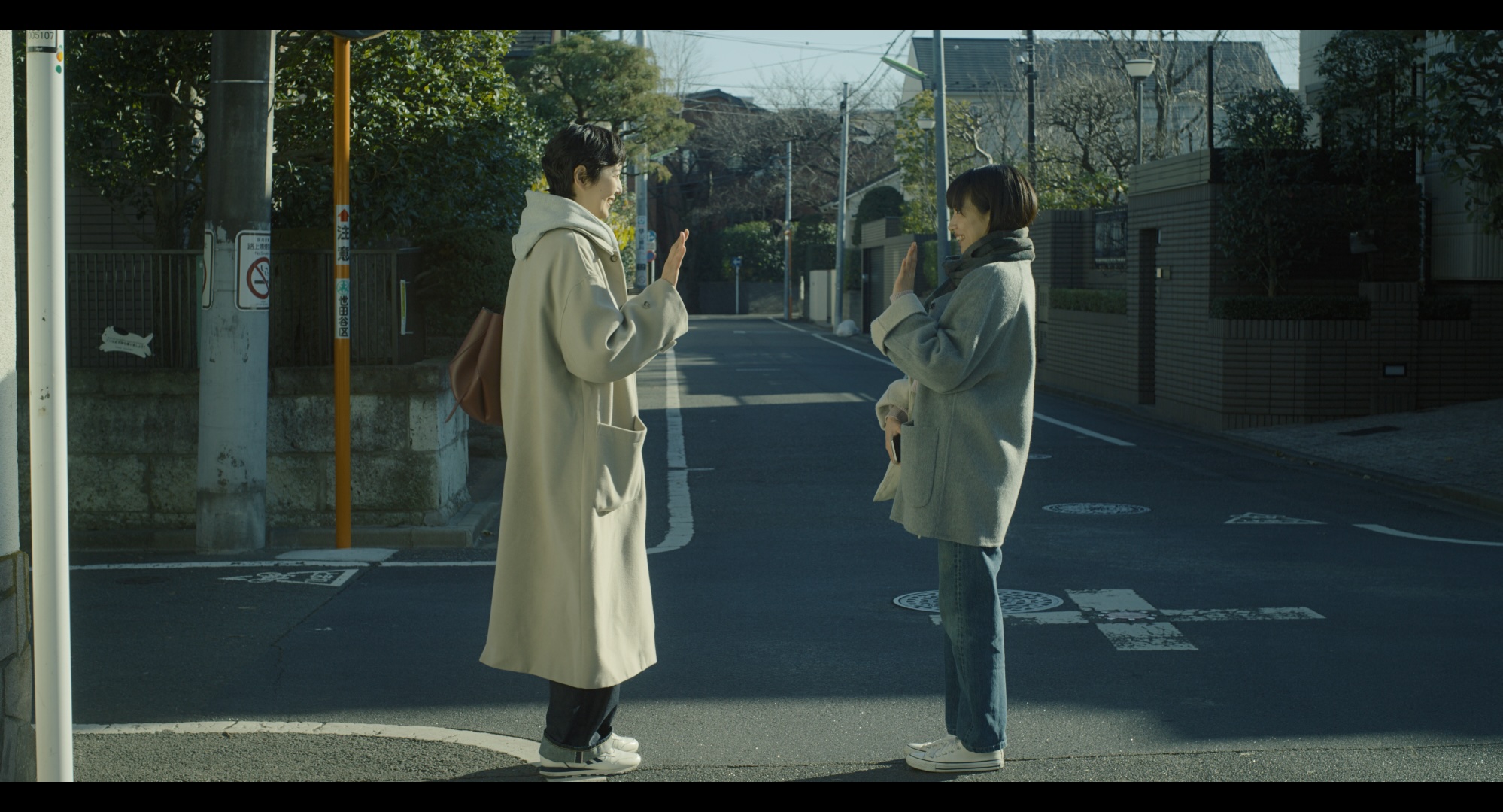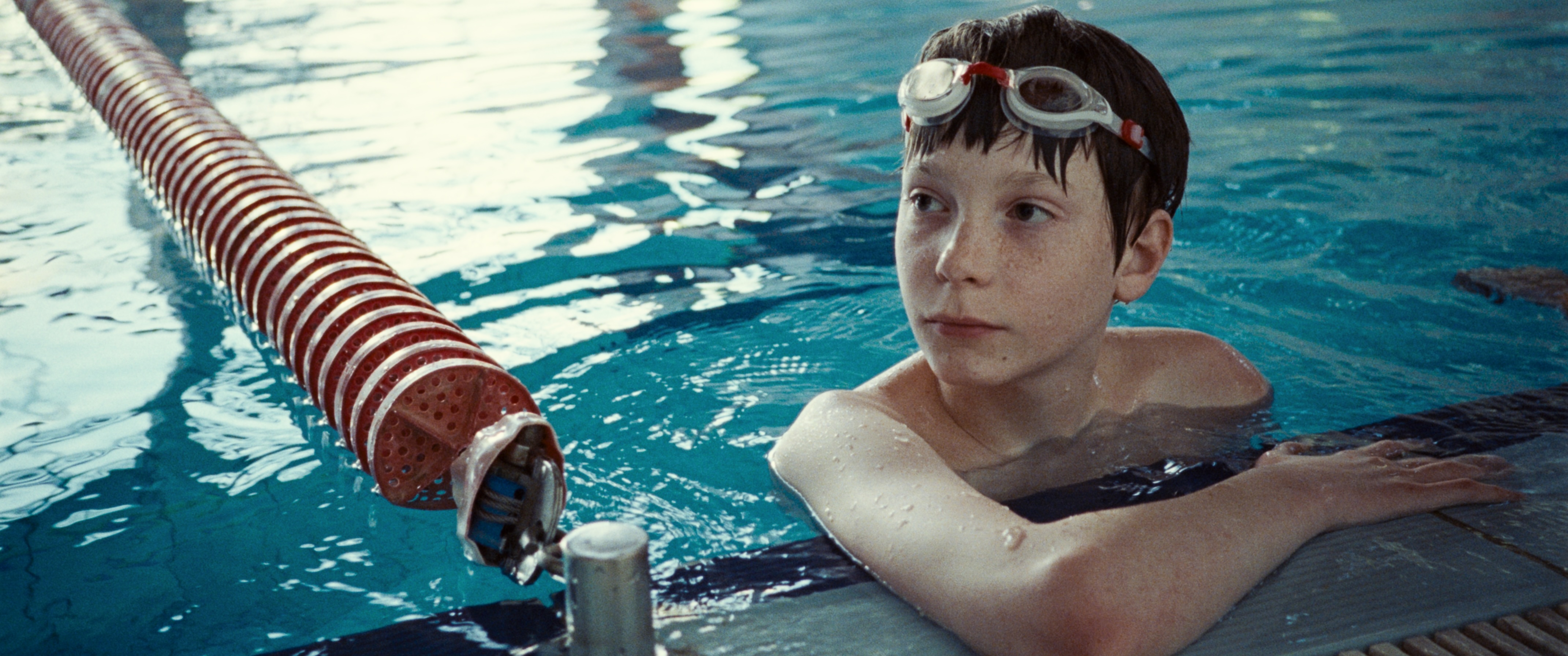
There’s a little moment less than an hour into “Brand New Landscape” that works as a microcosm of this Japanese film’s particular magic. In the scene, one of the lead characters is at his workplace, a location we’ve seen several times across the film already, as we see this character go about his workdays. This time, though, he’s being fired, which he’s told by a supervisor who sneaks up and screams, disrupting this environment that’s been relatively tranquil during its prior appearances. Calmly exiting the premises, the terminated employee comments on the embarrassing nature of the messenger’s conduct, causing that supervisor to hurl further abuse as they both leave the building.
This entire firing process occurs in an unbroken take, the 2:1 framing giving us a good look at the factory floor as various employees quietly try to do their work as this outburst is taking place. When the individuals causing the fuss exit the frame, storytelling logic would suggest that either the sequence ends here or that we cut to them outside to continue the argument up close. Instead, the shot that has slowly been zooming in — cinematographer Furuya Koichi (Kiyoshi Kurosawa’s “Chime”) behind the camera — keeps us in the room without a cut.
A few moments after those men have left, and while she’s still pretty far off in the distance, a young female employee (Misaki Hattori) stops what she’s doing and states at a low volume, “I quit. I quit this job.” As the shouting outside can still be heard, she makes her way to a different exit, bowing before four colleagues and thanking them by name. She pauses at the fifth and final person by the way out, clearly realizing she’s either forgotten his name or never knew it, deciding to just bow with a thanks but without a direct address. Once she reaches the street outside, the scene finally ends.
Aside from just being an amusing moment, this little detour with a character whose name we never learn within the main body of the film expands an overriding theme of writer-director Yuiga Danzuka‘s beautifully assured debut feature. The tangent the scene takes disrupts our perception of this particular location as it’s been established throughout the prior 50 minutes or so. What has just been The Protagonist’s Workplace, there primarily to put certain parts of his journey in motion, now comes alive as a place of possibility, as this background extra suddenly gets a narrative promotion; every person in any given environment has their own story going on, directly impacted by even the briefest intersection of everyone else’s stories.
“Brand New Landscape” is broadly about how spaces and places can mean so many different things to different people, and how our memories of an environment can be reshaped with new perspectives or distance (in all that word’s meanings). Danzuka, who is the youngest Japanese director ever to be featured in Directors’ Fortnight at Cannes, dedicates the film “in the memory of my mother and the city.”
That city is Tokyo, the ever-changing landscape of which is used as a mirror to explore whether meaningful transformation is also possible for a fractured family — and whether the public benefits of reshaping a city outweigh the damage that can be inflicted on individuals directly affected by such projects.
Such impacted parties include homeless people displaced by a park getting a commercial complex retrofitted to it, or workers for a building firm objecting to being part of such an operation that would worsen the situation for the city’s unhoused population. “Brand New Landscape” has far, far fewer structure-planning scenes than “The Brutalist,” but the ones it does have are no less riveting. And funnily enough, the extent to which the film’s sideways closing credits recall those found in Brady Corbet’s movie makes one wonder if Danzuka revised his own plans during the eight months between the two films’ respective premieres.

A landscape planner is one of the main players in the central story, though the movie starts before he’s a renowned one. The film opens on a flickering bulb on the ceiling of a highway rest stop, the camera taking us down to the building’s busy food court, though the family we’re meant to focus our attention on remain far away. At no point in the film’s nearly 20-minute opening prologue do husband, wife, and their two children exist within the same frame without it being filmed from a far distance. As a unit, they are but a small part of the greater space in the scene, but the lack of any intimate framing of them together also serves as a reflection of the parents’ strained relationship. And this particular meal will turn out to be their final one.
Once they’ve arrived at their rented holiday house with a nice view of the sea, teenage Emi (Riko Ishida) reads on the sofa while her younger brother Ren (Rintaro Arao) plays with a ball in the garden. Her parents are at the other end of the house, addressing an impasse that would seem to be the last straw for various issues that have long been at play; visually, they are framed as though a chasm separates them.
Despite having been asked to focus on his family for these three days on vacation, a call from Tokyo concerning an additional interview for a career-changing gig has Hajime (Kenichi Endo) stressing the need for him to leave early to return to the city, insisting that this opportunity will be of greater long-term benefit to the family than being fully present in this moment. As his wife Yumiko (Haruka Igawa) is worn down during their argument, she asks him to at least stay with the kids until the following day; he proposes to instead sneak out once they’re in bed that same night.
In the film’s main timeline ten years later, Yumiko has died by implied suicide, which happened during that vacation. Hajime got his wish with that contract and a successful firm, and left his children in Japan three years after their mother’s death to pursue work in other countries. The now-adult Ren (Kodai Kurosaki) works for a company that prepares and delivers expensive moth orchids, while Emi (Mai Kiryu) is set to move in with her boyfriend and likely marry him. Attempting to move forward with her life rather than dwelling on the past (and resolutely determined to never see her father again), she’s still haunted by her family’s fracturing in regards to having faith that any relationship can last.
An order of orchids reveals to Ren that his estranged father is back in town once more, both with new business operations and an exhibition celebrating his work. As attempted reconciliations are pursued by some and forced upon others, the unmoored siblings are pulled towards both their dad — the author of all their pain — and the places that were host to the last traces of their family being together, even if that stability was clearly hanging by a thread.
Danzuka spends a good deal of his delicate drama’s running time recontextualizing and reshaping his key locations to explore emotional connection via urban landscapes as a means for spiritual improvement, building towards an utterly spellbinding disruption of the film’s world that’s truly best left unspoiled but is absolutely magical stuff. If an only twenty-something director can so deftly pull off some of the swings that Danzuka does with aplomb in his debut feature, the cinematic landscape of Japan has a very promising future.
Grade: A-
“Brand New Landscape” premiered at the 2025 Cannes Film Festival. It is currently seeking U.S. distribution.
Want to stay up to date on IndieWire’s film reviews and critical thoughts? Subscribe here to our newly launched newsletter, In Review by David Ehrlich, in which our Chief Film Critic and Head Reviews Editor rounds up the best new reviews and streaming picks along with some exclusive musings — all only available to subscribers.



